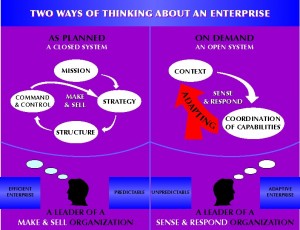In the business world there are typically two types of organisation. You’re either a make and sell kind, whereby you know exactly what you want to do, you make your wares, then do your best to promote those wares to customers. Simple. The other kind is a sense and respond kind, whereby you try your best to respond to the rapidly changing needs of your customers, and indeed to the marketplace.
Now of course, it’s not as simple as all that, and it is certainly far from black or white, with most organisations sitting somewhere along the axis from make and sell to sense and respond. Understanding which of these you’re most like however will significantly alter your social business strategies. You’ll literally want to get different things out of it. Lets look at each in turn.
Make and sell
In a make and sell type organisation, the assumption is that you largely know what is going on. You know what the customer wants. You know how the market is. You know what changes are afoot in your environment. In such a closed system, the goal therefore is to make what you do as efficient as possible.
Now I’m not here to judge you, and if this applies to you, then that’s fine, but beware that expecting to unleash innovation into such an environment will be a challenge, because you’re asking people to break the status quo, which kinda runs counter to everything else you’re telling them. If this kind of environment describes your workplace however, you can still use collaboration and innovation, but you should aim for the outcomes to be on how to do what you already do more effectively. Set your goal at improving efficiency and you can still obtain good results.
Sense and respond
If you’re workplace is more akin to a sense and respond environment however, the assumption is more that change is unpredictable. The organisation doesn’t contain all of the knowledge that it needs in order to thrive and must therefore be adaptive to the environment, with a constant flow of feedback from both inside and outside of the organisation.
Such an environment is undoubtedly a more natural home for social business, for it thrives on sharing knowledge. Such an environment demands information from the marketplace be communicated throughout the organisation, so employees are encouraged to share what they know. The acceptance of (relative) ignorance also encourages such an organisation to seek insights from external parties.
This post isn’t intended to judge, as there are no doubt many instances where efficiency is incredibly important, not to mention many organisations for whom that approach is the norm. What is important however is to have the insight to know what kind of organisation you are, and then use collaboration and innovation effectively.

Plus of course there's a big role for social business in actually the sensing part of this equation. For helping to uncover new knowledge and insight. Collaboration in itself suggests you know the outcome you want to achieve, but there's a whole lot more that could be achieved than that.